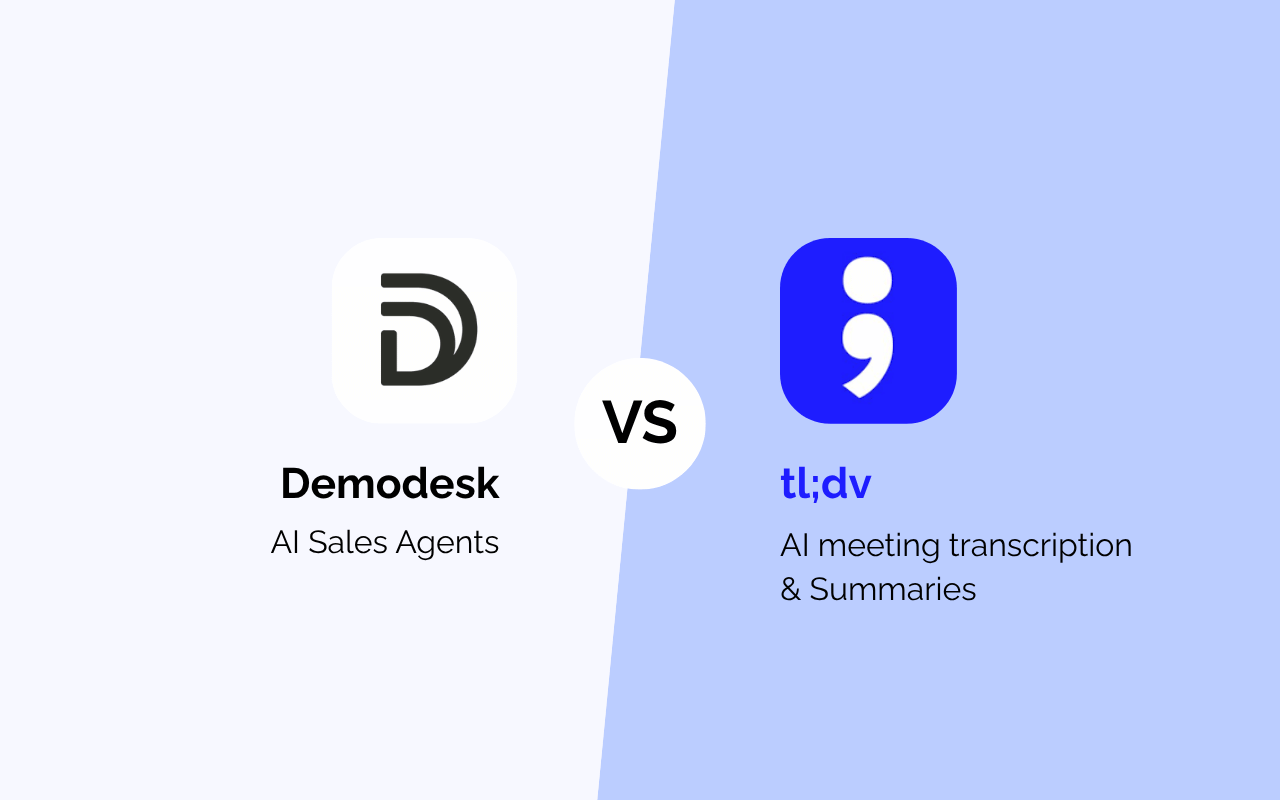When evaluating AI meeting tools, the key question isn't which platform has more features. It's which platform aligns with your team's specific goals and workflows. This comparison examines two distinct approaches: tl;dv as a versatile general-purpose solution and Demodesk as a specialized sales enablement platform.
Executive Summary
tl;dv excels as a comprehensive meeting recorder and note-taking tool that serves diverse team needs across HR, product management, project coordination, and individual productivity. Its strength lies in its versatility and ease of use across different use cases.
Demodesk takes a different approach, focusing specifically on revenue organizations that need specialized sales intelligence, live coaching capabilities, and CRM-native workflows. This platform is purpose-built for teams where meeting outcomes directly impact pipeline and revenue growth.
Our analysis shows that while both platforms handle basic meeting recording well, they serve fundamentally different organizational needs: tl;dv for broad team collaboration and Demodesk for sales performance optimization.
Scoring Methodology
We evaluated both platforms using a transparent 0–1–2 point system across granular sub-features relevant to different team types.
Scoring Rules:
- 2 points — Industry-leading capabilities or strong performance
- 1 point — Adequate functionality with room for improvement
- 0 points — Feature not available
Overall Score Summary
Detailed Feature Analysis
1. Transcription & Recording
Subtotal: Demodesk — 16/16 | tl;dv — 16/16
Key Distinctions:
- Demodesk formats transcripts specifically for sales workflows, automatically tagging content to CRM deals and structuring information for faster follow-up
- tl;dv provides excellent general-purpose transcripts suitable for various meeting types and team collaboration needs
2. AI Assistant & Follow-Up
Subtotal: Demodesk — 5/6 | tl;dv — 2/6
3. Coaching Capabilities
Subtotal: Demodesk — 10/10 | tl;dv — 7/10
Coaching Philosophy Differences:
Demodesk provides:
- Specificaly Sales Coaching
- Sales performance tracking
- Pipeline efficiency suggestions
- Scorecards based on proven sales methodologies
tl;dv offers:
- General coaching capabilities suitable for various meeting types
- Project management-focused performance tracking
- Broad applicability across different team functions
4. AI Analyst & Revenue Intelligence
Subtotal: Demodesk — 12/12 | tl;dv — 2/12
The Revenue Intelligence Focus:
- Demodesk includes pipeline visibility, win-rate tracking, forecasting tools, and deal execution analytics designed for revenue teams
- tl;dv focuses on general meeting analytics without revenue-specific insights, which aligns with its broader team collaboration mission
5. AI CRM Concierge
Subtotal: Demodesk — 6/6 | tl;dv — 3/6
6. Integrations
Subtotal: Demodesk — 10/10 | tl;dv — 6/10
7. Admin, Security & Support
Subtotal: Demodesk — 12/12 | tl;dv — 8/12
Platform Specialization Analysis
The fundamental difference between these platforms lies in their approach to meeting intelligence. Demodesk focuses specifically on sales-driven conversations, offering deal risk identification based on conversation patterns, talk-to-listen ratio optimization for sales success, and product knowledge scoring tied directly to revenue outcomes. The platform also provides objection handling analysis with coaching recommendations and competitive mention tracking with response guidance tailored for sales scenarios.
In contrast, tl;dv takes a broader approach that serves multiple organizational needs. The platform excels at general meeting performance analytics and cross-functional team collaboration, providing universal conversation insights that work across any meeting type with flexible note-taking capabilities suitable for various business contexts.
When it comes to documentation and workflow integration, the platforms diverge significantly. Demodesk provides structured sales processes including qualification checklists for frameworks like BANT and MEDDIC, automated objection logs with response tracking, and follow-up templates specifically designed for deal progression. Everything is formatted for immediate CRM action, reducing friction in the sales process.
Meanwhile, tl;dv offers flexible note-taking with robust tagging and commenting systems, general meeting documentation that adapts to any context, and collaborative features designed for cross-team communication with adaptable summaries for various meeting types.
Ideal Use Cases and Implementation
tl;dv serves organizations best when meetings span multiple departments and functions. HR teams conducting interviews and performance reviews benefit from its comprehensive documentation capabilities, while individual contributors appreciate the thorough meeting records. Project managers coordinating across departments find the cross-functional collaboration tools particularly valuable, and organizations with diverse meeting recording needs across different contexts appreciate its flexibility and cost-effectiveness.
Demodesk is purpose-built for revenue-focused teams where every conversation has pipeline implications. Sales development teams focused on lead qualification can leverage its specialized frameworks, while account executives managing complex deal cycles benefit from the integrated CRM workflows. Sales managers coaching team performance appreciate the revenue-focused analytics, and sales enablement leaders scaling performance across organizations find measurable impact through specialized features.
From an implementation perspective, tl;dv offers quick setup with an intuitive interface for general users, excellent transcription quality across various meeting types, and strong import capabilities for existing recordings. Its broad applicability makes it cost-effective for organizations needing meeting intelligence across different functions.
Demodesk provides deep CRM integration with minimal setup requirements for sales teams, specialized AI trained specifically on sales conversation patterns, and live coaching capabilities during active calls. The platform delivers measurable impact on sales performance metrics, making it ideal for revenue-focused implementations.
Performance Outcomes and Decision Framework
Organizations implementing these platforms see different types of results based on their focus areas. Demodesk users report quantifiable sales improvements:
- 25% faster sales rep onboarding
- 15% improvement in close rates
- 30% reduction in sales cycle length
- Enhanced pipeline predictability and forecasting accuracy
Teams using tl;dv experience operational improvements:
- Improved meeting documentation consistency
- Enhanced cross-team collaboration
- Reduced time spent on manual note-taking
- Better meeting follow-up across various contexts
Making the Right Choice
The decision between these platforms ultimately depends on your organization's primary meeting objectives and the role conversations play in your business outcomes.
Choose tl;dv when your organization needs meeting intelligence that spans multiple departments, where recording and documentation serve primarily compliance or reference purposes. This platform works well when you require a cost-effective solution for diverse meeting types, where cross-functional collaboration is the primary goal, and when you prefer flexibility over specialized features.
Choose Demodesk when revenue generation is your primary meeting objective and you need specialized sales coaching with performance analytics. The platform becomes essential when CRM integration and workflow automation are critical to your operations, when pipeline visibility and forecasting accuracy directly impact your business success, and when you want measurable impact on sales performance.
Both platforms represent excellent solutions within their respective specializations. tl;dv delivers outstanding general-purpose meeting intelligence that adapts to various team functions and use cases, while Demodesk provides specialized sales enablement capabilities designed specifically for revenue-generating conversations. The key is aligning your choice with your organization's primary objectives: broad team collaboration and general documentation favor tl;dv, while sales performance optimization and revenue growth point toward Demodesk.
Consider your team's specific needs, primary use cases, and desired outcomes when making your selection. For revenue-focused organizations, Demodesk's specialized features, CRM integration, and sales-specific intelligence provide measurable business impact. For teams requiring versatile meeting documentation across various contexts, tl;dv offers excellent general-purpose capabilities that serve diverse organizational needs.

%201.avif)











